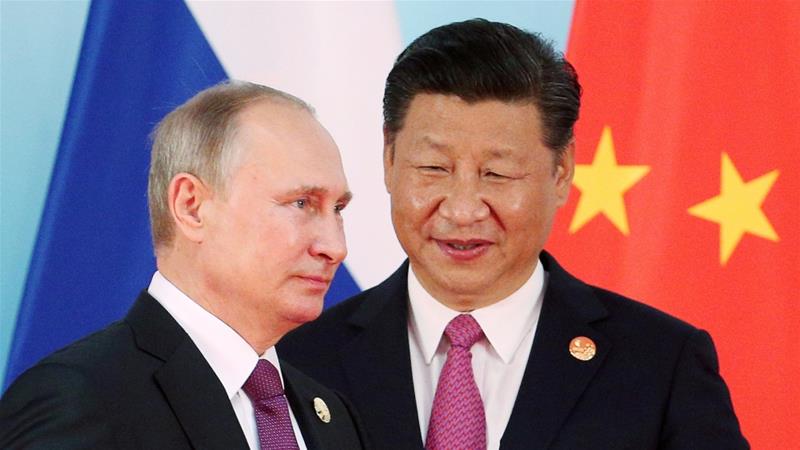China’s transactional relations with countries across the world are getting damaged and its wolf-warrior diplomacy is slowly reducing it into a pariah. The only major power with which Beijing seems to have some kind of diplomatic proximity left is Moscow. But Russia itself seems to be developing cold feet about an expansionist and belligerent China. Chinese President Xi Jinping is naturally panicked about Sino-Russian ties.
According to Chinese state media Xinhua news, the foreign ministers of China and Russia held a telephone conversation on Friday, in which they opposed “US unilateralism”. Chinese foreign minister Wang Yi told Russia’s Sergei Lavrov that Beijing felt the US was pursuing a “Cold War mentality” in its policy toward China.
On July 8, Xi Jinping called up the Russian President Vladimir Putin. During the telephonic conversation, the Chinese President tried complaining about American unilateralism without actually naming the US. This was a desperate bid to ensure that the “axis of convenience” between Beijing and Moscow doesn’t suffer a death blow amidst American attempts at a rapprochement with Russia.
The Ministry of Foreign Affairs in China issued a statement reading, “Xi expressed China’s readiness to work with Russia for closer coordination and cooperation at the United Nations and other multilateral frameworks, to uphold multilateralism, oppose hegemonism and unilateral actions, and jointly defend international equity and justice.”
Xi Jinping is showing a natural sense of urgency because he knows that the Sino-Russian relationship stands on a very weak footing. The US too is making inroads now. The US Secretary of State, Mike Pompeo believes that with China’s rise, there is an inherent opportunity to interact for a different relationship with Moscow.
The Trump administration could also be of the opinion that Russians would want a better relationship with Washington. The Russian economy has been ravaged by painful American sanctions that have pushed Moscow out of the global dollar-based system. It is in Moscow’s larger interest to move towards rapprochement within the US.
“Pompeo also appears to believe that the rise of China creates an opportunity for a different relationship with Russia. ‘The Russians want a better relationship,’ he says. ‘I’ll probably spend a great deal of time w/Lavrov trying to work together.’ “ https://t.co/yAuej8Q22R
— John Harwood (@JohnJHarwood) January 7, 2020
Pompeo has also interacted extensively with his Russian counterpart Sergei Lavrov. At the cost of extensive opposition both within and outside the US, the Trump administration has shown willingness to formulate some kind of a working relationship with Moscow.
Earlier this year, Putin for the expanded Group of 7 (G-7) Summit, an alliance against China. Canada and the UK opposed the invitation but the US President maintained that it is ‘common sense’ to invite Russia.
Xi Jinping is already cornered in the Indo-Pacific. The Quad- an informal alliance of the US, India, Australia and Japan to contain China in the Indo-Pacific, as well as the ASEAN are getting more and more united against Chinese belligerence. In these circumstances, China cannot afford to lose Russia, even though Moscow might only be a transactional partner as opposed to a friend for Beijing.
An American-Russian rapprochement is a nightmare come true for China, and the Trump administration knows it. The US has been careful not to antagonise Putin at this critical juncture. This is why the Pentagon hasn’t overreacted to American newspaper reports which allege that the US Intelligence believed that a Russian unit had paid bounties to Taliban-linked militants for killing American troops.
There has been a lot of outrage within the United States, but the Trump administration hasn’t gone overboard because its prime focus right now is China. Reactions from Trump and his stalwart ally Mike Pompeo speak for themselves. Trump said, “I think it’s a hoax by the newspapers and the Democrats.” Pompeo said it was “nothing new” that Russia was acting against American interests in Afghanistan.
Thus, Trump has kept the door open for Putin even if it comes at the cost of battling an entire ecosystem months before the Presidential polls.
As for Russia, a relationship with China is more of a necessary evil in the background of European and American sanctions. The Russian relationship with China is superficial- it focuses on areas of cooperation where there is common interest and painfully avoids areas of conflict and competition.
In their interactions, Russia and China ignore issues like growing Chinese influence in Eurasia and Moscow’s insecurities about the resource-rich Russian Far East which is being targeted by the Chinese. The Arctic too is becoming an area of conflict though the two countries continue to sidestep the contentious issue. All this can change very quickly if the US-Russian relationship improves.
In fact, Xi Jinping is leaving no stone unturned to assure Putin about safeguarding each other’s “sovereignty, security and development interests.” This essentially follows after the wolf-warriors of China staked claim on Vladivostok, a Russian city in the country’s Far East.
The overzealous diplomats of China, and State-owned media, have stirred up the hornet’s nest by bringing in territorial claims in the Sino-Russian relationship. Washington’s biggest ally in the Indo-Pacific, New Delhi has grabbed this opportunity to encourage Russia into pursuing its interests in the Indo-Pacific.
New Delhi, as well as Washington, might want Russia to pursue the Vladivostok-Chennai sea route proposal with a lot more excitement in order to confront possible Chinese belligerence in the region. China understands how his overzealous diplomats might have drifted Russia further away creating an occasion for more interaction between Moscow and Washington (and also New Delhi).
Xi Jinping’s phone call to Putin was therefore not a show of solidarity. It was a desperate call by a narcissist leader to retain the only transactional partner that seems to be drifting away.
